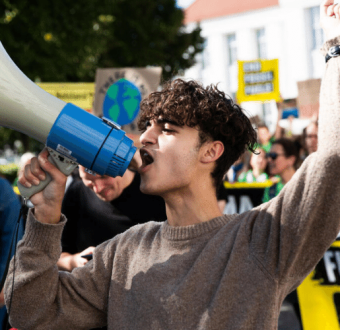Greenpeace International has published a new report, “Justice for People and Planet”,[1] featuring 20 cases of environmental and human rights abuses committed by transnational corporations. [2] The report also presents ten fundamental principles needed to stop such abuses. [3] It includes case studies on Energy Transfer Partners and Resolute Forest Products, two companies that are suing environmental organizations like Greenpeace under racketeering laws in the United States in an attempt to silence opposition to their corporate bad practices. [4]
“Companies like Energy Transfer Partners and Resolute Forest Products are emboldened by a fractured political and economic system to push for an agenda that puts profit over people and planet. This needs to stop now. As Trump — the personification of this broken system — and other political representatives sit down with the CEOs in Davos next week, they shouldn’t overlook human rights violations, harassment of activists and communities, prosecution of free speech, and the destruction of our shared environment. The movement to protect our forests, our climate, precious water resources, and our democracy is unstoppable, and these lawsuits will not succeed in suppressing the vital voices of affected communities and their allies,” said Greenpeace USA Campaigner Molly Dorozenski.
In parallel, Greenpeace Switzerland activists have unveiled a 20 feet-high statue of Justice on the outskirts of Davos, as a reminder of the fundamental principles at stake while political and corporate leadership meet there for the World Economic Forum next week. [5]
“Justice for People and Planet” calls on governments to impose effective and binding rules on corporate behavior and to hold companies accountable for their actions. The 20 cases in the report show that governments have willingly or unwillingly become enablers of corporate impunity. In the U.S. both Energy Transfer and Resolute used Trump’s go-to law firm to file meritless racketeering cases against activists and environmental organizations, while Mr. Trump himself held a stake in Energy Transfer Partners until he became President.
“If corporations were held to the highest applicable standard, be that at home or abroad, it would go a long way to healing our fractured world. And if company directors risked fines or jail for the misdeeds of their subsidiaries and subcontractors, corporate accountability could become a reality rather than a myth,” said Greenpeace International Senior Political Strategist Shira Stanton.
Greenpeace is supporting the launch of its report with the release of the short comedy film ‘It’s not business, it’s personal’, [6] produced by Don’t Panic! [7] London, which imagines what would happen if a person were granted the privileges extended to corporations.
ENDS
Notes to editors:
[1] Click here to access the executive summary of “Justice for People and Planet”, or copy the following link to your browser: http://www.greenpeace.org/international/Global/international/publications/other/2018/Justice-Report-Exec-Summary.pdf
Click here to access the full report, or copy the following link to your browser: http://www.greenpeace.org/international/Global/international/publications/other/2018/Justice-for-people-and-planet.pdf
[2] The corporations examined in the 20 case studies are ACS Group (Grupo Cobra), The Carbon Majors (47 companies), DowDuPont, Energy Transfer Partners, Exxon, Gabriel Resources, Glencore, Grupo Bimbo, Halcyon Agri (Sudcam), ICIG (Miteni), Keskinoğlu, Monsanto, Nestlé, Novartis (Sandoz), Resolute Forest Products, Rosatom, Schörghuber group (Ventisqueros), Total, Trafigura, and VW.
The following corporations are named in the report and are also official partners or participants in the WEF: Dow Chemical Company (DowDuPont), Glencore, Monsanto, Nestlé, Novartis, Total, Trafigura, Volkswagen VW, BP, Eni, LUKOIL, Shell, Suncor, ArcelorMittal, Barclays, Citi, Facebook, Google, and JPMorgan Chase & Co.
[3] The ten common sense Corporate Accountability Principles that Greenpeace International presents in “Justice for People and Planet” are:
- People and the environment, not corporations, must be at the heart of governance and public life.
- Public participation should be inherent to all policy making.
- States should abandon policies that undermine environmental and human rights.
- Corporations should be subject to binding rules both where they are based and where they operate.
- States should require due diligence reporting and cradle to grave responsibility for corporate products and services.
- States should promote a race to the top by prohibiting corporations from carrying out activities abroad which are prohibited in their home state for reasons of risks to environmental or human rights.
- States should create policies that provide transparency in all corporate and government activities that impact environmental and human rights, including in trade, tax, finance and investment regimes.
- Corporations and those individuals who direct them should be liable for environmental and human rights violations committed domestically or abroad by companies under their control.
- People affected by environmental and human rights violations should be guaranteed their right to effective access to remedy, including in company home states where necessary.
- States must actually enforce the regulatory and policy frameworks they create.
[4] Click here to access the Energy Transfer Partners case. Click here to access the Resolute Forest Products case.
[5] Click here to access the images from the 20 feet-high statue of Justice on the outskirts of Davos, or copy the following link to your browser: http://media.greenpeace.org/collection/27MZIFJX3QB3Y
[6] Click here to access the video “It’s not business, it’s just personal”, or copy the following link to your browser: www.greenpeace.org/justice
[7] Greenpeace has partnered with Don’t Panic! in the past to produce campaigns like the video that went viral and contributed to ending Lego’s commercial relationship with Shell when the oil company was planning to drill in the Arctic.
Media contact in the U.S.
Rodrigo Estrada, [email protected], +1 202-478-6632



